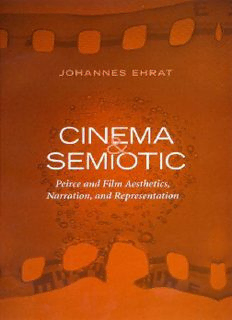
Cinema and Semiotic: Peirce and Film Aesthetics, Narration, and Representation PDF
Preview Cinema and Semiotic: Peirce and Film Aesthetics, Narration, and Representation
CINEMA AND SEMIOTIC: PEIRCE AND FILM AESTHETICS, NARRATION, AND REPRESENTATION This page intentionally left blank Cinema and Semiotic Peirce and Film Aesthetics, Narration, and Representation Johannes Ehrat UNIVERSITY OF TORONTO PRESS Toronto Buffalo London www.utppublishing.com © UniversityofTorontoPressIncorporated2005 Toronto Buffalo London PrintedinCanada ISBN0-8020-3912-X Printedonacid-freepaper LibraryandArchivesCanadaCataloguinginPublication Ehrat,Johannes,1952– Cinemaandsemiotic:Peirceandfilmaesthetics,narration,and representation/JohannesEhrat. (Torontostudiesinsemioticsandcommunication) Includesbibliographicalreferencesandindex. ISBN0-8020-3912-X 1.Motionpictures–Semiotics. 2.Motionpictures–Aesthetics. 3.Peirce,CharlesS.(CharlesSanders),1839–1914. I.Title. II.Series. PN1995.E3972005 791.4390194 C2004-901722-5 UniversityofTorontoPressacknowledgesthefinancialassistancetoits publishingprogramoftheCanadaCouncilandtheOntarioArtsCouncil. UniversityofTorontoPressacknowledgesthefinancialsupportforits publishingactivitiesoftheGovernmentofCanadathroughtheBook PublishingIndustryDevelopmentProgram(BPIDP). SaintPaul,jecrois,disaitquel’imageaurasaplénitudedanslarésurrection Jean-LucGodard,quotedinIshaghpour(1986),297 This page intentionally left blank Contents Acknowledgments ix Introduction 3 1 OnSigns,Categories,andRealityandHowTheyRelateto Cinema 8 1.1 TheUseofSigns 14 1.2 TheConstructionofMeaning 24 1.3 InvestigatingConductasaForm 31 1.4 TheCategoriesofBehaviour 50 1.5 TheCategorialFormofBehaviour 54 1.6 LogicofRelations 69 1.7 TheMetaphysicsofPragmaticisticSemiotic 96 2 SemioticandItsPracticalUseforCinema 112 2.1 Cinema‘Is’aClassofSign 116 2.2 TheIconismofCinema:AfirstSemioticApproach 135 2.3 (FromFilmPragmaticsto)ThePragmaticismofCinema 148 3 What‘Is’Cinema? 165 3.1 Cinema‘Is’Syntagma 171 3.2 Cinema‘Is’SignFunction 180 3.3 Cinema‘Is’Percept 191 3.4 Cinema‘Is’MovingMatterorTime 214 3.5 WhatCinemaBecomes:TheoryObjectsCompared,Reconciled, Rejected 243 Intermezzo:CinematicImaginationofGodard’sJevoussalue, Marie 248 viii Contents 4 NarrationinFilmandFilmTheory 283 4.1 TheNarratologicalQuestion,Peirce,andCinema 284 4.2 TheSemioticofNarrativeTime 287 4.3 CinematicTime 314 Intermezzo:TwoKindsofNarrativeTimeinDreyer’sOrdet 320 5 Narration,Time,andNarratologies 345 5.1 Ricoeur’sMimesis 346 5.2 Heidegger’sEkstasis 350 5.3 Aristotle’sPoesis 360 5.4 Greimas’sSemiosis 371 5.5 Bordwell’sFormalism 379 5.6 Olmi’sGenesi 387 6 EnunciationinCinema 398 6.1 Enunciation:FromVaguenesstoGenerality 401 6.2 NarrativeEnunciation 409 6.3 RhetoricalEnunciationinCinema:MeaninginFigures 435 6.4 AestheticEnunciationinFilm 457 Epilogue:TwoAestheticProcessesinCinema 528 Conclusion 555 Notes 561 Bibliography 649 Filmography,byDirector 663 Index 667 Acknowledgments Cinematography (movement-writing) began as steganography (hid- den writing on the wall of the Roman College). Athanasius Kircher, S.J.,iscreditedwiththeinventionofcinemaasideaandasapparatus. He called it steganographia catoptrica (fol. 912) in his Ars magna lucis et umbraeindecemlibrosdigesta,quibusadmirandaelucisetumbraeinmundo, atque adeo universa natura, vires effectusque uti nova, ita varia novorum reconditiorumque speciminum exhibitione, ad varios mortalium usus, pand- untur; only later it went by its hallmark laterna magica. This was in 1646. Fr Kircher was more interested in bringing the hidden truth to light(somuchabouttheseminal‘cinematicapparatus’)thaninenter- taining (even though his demonstrations of the laterna magica in the Roman College apparently were also major social events, of which he wasperfectlyawarewhenhewroteontheverysamefol.912:‘Notan- dum&hicliterassingulasnescioquooccultonaturaepictricisartificio omni colorum genere depictas videri: quae res uti insolens est, ita & dicivixpostest,quantaminspectatoribusadmirationemsuscitet’). Itismyjoy to continue humbly –in this same venerable Collegium Romanum (which became the Gregorian University) – the intellectual pursuit of the secrets of light and shadows (also ad varios mortalium usus&a.m.D.g.). Myownadmiratioforcinemakeptgrowingasaresultoflongstudy. Thegroundwaslaidinparticularbyafewteachers,towhomIremain grateful and indebted. Marc Gervais, S.J. (Loyola campus, Montreal), taughtmeeverythingaboutcinemaandforcedmetoemphaticallysee andwrite(sanssplitinfinitives,clareetdistincte,inplainEnglish)what cinematographiceyesseeandnotwhatmindspeculates.Iowehimall my love for cinema. Enrico Carontini (Université du Québec à Mont-
Description: